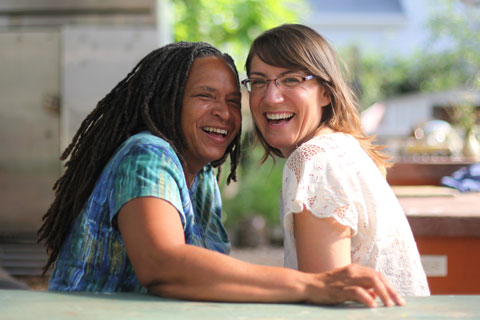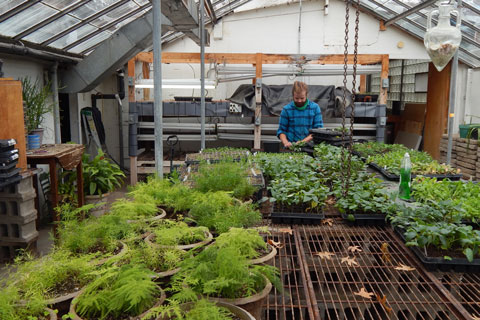3/1/2019
Retail With Love
Linc Thomas

In South City St. Louis, the Dutchtown neighborhood is dotted with eccentric architecture. Rich history, classic buildings and autumn leaves are what most will find when visiting in mid-November. Amidst eerily similar buildings is an odd green building that appears to have no business in such a scene. That green building is home to Urban Buds—City Grown Flowers.
Miranda Duschack has a background in sustainable agriculture and extension. Karen “Mimo” Davis has over 25 years of farming experience and founded one of the largest flower farms in Missouri, Wild Thang Farms. They run Urban Buds together and both have extensive backgrounds in agriculture. With their combined 40 years of experience, the duo is bubbling with love for flowers and the city they serve.
Pictured: Urban Buds owners (from left to right) Karen “Mimo” Davis and Miranda Duschack.
With each season extending to 10 months, Urban Buds grows more than 70 varieties of cut flowers on roughly one acre.
“We bought the farm at the height of the recession,” Miranda says. “We bought it from a minister who was going to train the homeless in green technology. His project was stymied, and when we came along and found this property, I showed it to Mimo and she said, ‘Let’s buy it!’ and we did!”
A Rich History
The land Urban Buds rests on was formerly a flower farm started by German settlers in the late 1800s. With population influx into St. Louis commanding more space around the 1920s, floriculture adapted just as it always had. The farm transitioned into a florist storefront that, until the mid-90s, was in full-swing of production.
“In liaison with city, working with the sewer district, the St. Louis Assessor’s Office and the department of agriculture, we were able to turn this property into an urban farm. We were really paving the paperwork trail of how to legally have an agricultural business in the city,” Miranda notes.
In addition to those organizations mentioned above, Urban Buds recognizes The Association of Specialty Cut Flower Growers; the City of St. Louis Business Assistance Center; The Alderman for the 25th Ward, Shane Cohn; the Land Reutilization Authority; and the City of St. Louis Facade Improvement Program. Without this vast number of influencers and organizations, urban farming wouldn’t exist.
Working the Land
Due to location, Urban Buds has built up their soil rather than digging deeper into the earth. Trucked-in soil and sustainable amendment practices are at the core of Urban Buds’ operation.
“It’s been a process of soil rejuvenation,” says Miranda. “We know for a fact that the glass has been up for 70 years. We do a lot of composting, flooding of the greenhouse and cover crops to help heal the soil because it has to be the foundation.
“The Noble Foundation recently did a documentary on soil health called ‘Living Soil.’ We were a part of this project and it’s important to note that soil health should be considered in all areas of agriculture.”
 Pictured: Morgan Hopkins, an employee at Urban Buds, works in the greenhouse at the urban St. Louis operation.
Pictured: Morgan Hopkins, an employee at Urban Buds, works in the greenhouse at the urban St. Louis operation.
Conscious consumers everywhere are deciding to take their love for locality further than the produce stand. The relationship between farmers and their customers is solely centered around trust and is often fostered with a simple handshake.
“The local food movement has soared in communities across the country,” Mimo says. “I think floriculture has ridden the coattail of that. If you have this beautiful food on your table next to flowers that are drenched in chemicals—there is obviously some disconnect there. There are more people involved with asking where everything came from, not just the food.
“People want to know their farmer. The old way of thinking of farmers as low-class citizens or peasants is there in some way, but there’s a higher level of respect now.
“Being an urban flower farm, everything works to our advantage,” Mimo adds. “I don’t do any deliveries anymore; I don’t have to drive a truck around—the florists come to us. I used to have a rural farm and had to drive two hours into St. Louis before I had even made my first stop. We’re urban farmers and farmers need to be on the farm.”
Persevering Through Hard Work
When Urban Buds first put down roots in St. Louis, they weren't alone. Mimo and Miranda started out with roughly 15 cohorts running urban farms in and around the city. Of those 15, only about five remain, including Urban Buds.
“In 2010/2011, people were getting out of college and couldn’t find jobs,” Miranda says. “Then people said, ‘I’m going to start an urban farm in St. Louis.’ As the economy got better, farms started to shut down. This is hard work and it takes a very specific kind of person to carry on this work when there are better opportunities out there. You have to love what you do.
“A hundred years ago, 80% of the population was involved in agriculture—because they had to,” Miranda adds, “But people don’t want these jobs; there’s a reason mechanization happened. It takes a certain kind of person to do this work and find it enjoyable. And, in fact, so enjoyable that I couldn’t sit in an office. You’d have to kill me.”
The pair concludes that each year the farm keeps getting better—both quality of flower and financial stability alike. In St. Louis, Mimo and Miranda are contributing to the community and delivering a beautiful product. Bringing locally sourced products to the community and being able to tell them “this was grown 2 miles from here” opens customers to the curiosity about where other things came from. The more consumers ask questions, the more opportunities farmers will have to teach them. GP
Linc Thomas is a freelance writer from Eastern North Carolina. Linc studies Horticultural Science at Colorado State University, with a concentration in Floriculture. He can be reached at lpthomas@rams.colostate.edu.